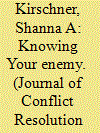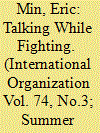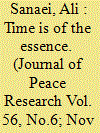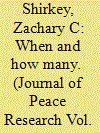|
|
|
Sort Order |
|
|
|
Items / Page
|
|
|
|
|
|
|
| Srl | Item |
| 1 |
ID:
157586


|
|
|
|
|
| Summary/Abstract |
This article analyzes the length of interstate wars and the process of reaching a mutually acceptable bargaining solution. Rational choice scholarship has mainly sought to explain long wars in terms of commitment problems and private information. This article complements these rational choice perspectives by arguing that causal beliefs – a variable not considered by previous research – can also prolong wars by increasing expectations of battlefield performance and slowing down information updating. It illustrates the role of religiously based causal beliefs with the case of one of the longest interstate wars of modern time, the Iran–Iraq War of 1980–88. Even though commitment problems were present, they do not identify the root cause of Iran’s high expected utility of continuing the war, as religiously based causal beliefs played a more prominent role in prolonging the war. Religious causal beliefs constitute a real word mechanism that not only creates different priors about expected military capacity, but also slows down the process of updating beliefs, as battlefield events are not seen as credible information. Although the prevalence of religious conflicts has increased over time, the formation of beliefs and their effects on wars remains understudied when applying rational choice to real world conflicts.
|
|
|
|
|
|
|
|
|
|
|
|
|
|
|
|
| 2 |
ID:
100285


|
|
|
|
|
| Publication |
2010.
|
| Summary/Abstract |
When do civil wars last especially long? Commitment problems can stymie conflict resolution but they are not homogeneous across all civil wars. Indeed, combatants' perceptions of their adversaries significantly affect the severity of commitment problems. Intergroup interactions provide combatants with one crucial type of information about their adversaries and about the risks associated with signing a peace settlement, shaping strategic decisions. The argument is tested against a new data set of all ethnic civil wars between 1945 and 2004. The results demonstrate that intergroup interactions prolong wars when they indicate that a peace deal will be especially fragile or that the costs of it breaking down will be especially high. This is true, regardless of the combatants' goals or their capabilities. In sum, information shapes perceptions and the severity of commitment problems, in turn affecting the duration of civil wars.
|
|
|
|
|
|
|
|
|
|
|
|
|
|
|
|
| 3 |
ID:
113755


|
|
|
|
|
| Publication |
2012.
|
| Summary/Abstract |
The systemic offense-defense theory argues that the security dilemma and the risk of war become doubly severe in offense-dominant eras in the state system. However, the theory assumes in support of its main argument that wars are shorter when offense has the advantage. This article empirically tests the expected connection between the systemic offense-defense balance and war duration. A statistical analysis of wars 1817-1992 disconfirms the theory's expectations. The article then draws different conclusions about the severity of the security dilemma when offense is dominant: both arms racing and the fear of aggression that the security dilemma thrives on should be less severe than offense-defense theorists assume.
|
|
|
|
|
|
|
|
|
|
|
|
|
|
|
|
| 4 |
ID:
172835


|
|
|
|
|
| Summary/Abstract |
Contemporary studies of conflict have adopted approaches that minimize the importance of negotiation during war or treat it as a constant and mechanical activity. This is strongly related to the lack of systematic data that track and illustrate the complex nature of wartime diplomacy. I address these issues by creating and exploring a new daily-level data set of negotiations in all interstate wars from 1816 to the present. I find strong indications that post-1945 wars feature more frequent negotiations and that these negotiations are far less predictive of war termination. Evidence suggests that increased international pressures for peace and stability after World War II, especially emanating from nuclear weapons and international alliances, account for this trend. These original data and insights establish a dynamic research agenda that enables a more policy-relevant study of conflict management, highlights a historical angle to conflict resolution, and speaks to the utility of viewing diplomacy as an essential dimension to understanding war.
|
|
|
|
|
|
|
|
|
|
|
|
|
|
|
|
| 5 |
ID:
168999


|
|
|
|
|
| Summary/Abstract |
It is often observed that public support for asymmetric wars diminishes over time, but the micro foundations of this observation are not fully understood. I present a modified war of attrition model for asymmetric wars which shows that as time passes, belligerents’ expectations for the remaining duration of war increase and they find fighting less favorable. Even when we keep the average rate of casualty accrual constant, the anticipated length of fighting into the future affects expected remaining costs of war. Therefore, in a cost-benefit calculation, observed duration causally affects expected remaining costs of war and, hence, leads to lower levels of support for war over time. The longer the war lasts, the more it will look like a never-ending war which may encourage the strong side to cut its losses short and stop the war. Because duration and aggregate costs are highly correlated in observational data, I use a randomized survey experiment to separate the effect of duration from the effect of costs on support for war. The result is that duration has a negative effect on public support which is independent of aggregate costs. This helps us better understand the limits of democratic states’ capabilities in fighting asymmetric wars and suggests that when military planners ignore the role of time, they deploy weaker-than-optimal forces.
|
|
|
|
|
|
|
|
|
|
|
|
|
|
|
|
| 6 |
ID:
146240


|
|
|
|
|
| Summary/Abstract |
This article argues that private information plays an important role in explaining long wars. Existing rationalist explanations of long, intensely fought wars focus on commitment problems rather than private information as the cause of such wars. Commitment-problem explanations of long wars claim that while private information can explain short wars, battles and exchanges of offers for settlement should quickly reveal private information, thereby leading to an early peace. Commitment problems, on the other hand, may take years to resolve and therefore can explain long, intense wars for unitary actors. However, while commitment problems are an important explanation for long wars, private information can endure deep into lengthy conflicts because states create new private information during wars and because states often disagree about their relative ability to bear costs rather than their relative military capabilities. I explore this argument in cases on the end of the First World War and the Iran–Iraq War.
|
|
|
|
|
|
|
|
|
|
|
|
|
|
|
|
| 7 |
ID:
112779


|
|
|
|
|
| Publication |
2012.
|
| Summary/Abstract |
What makes some wars longer and more severe than others is an important question in international relations scholarship. One underexplored answer to this question is the role that third party joiners play in lengthening conflicts, especially those states that intervene militarily after a war's initial stages. This article argues that late joining complicates bargaining by adding new issues to the war and increases uncertainty about the relative balance of forces. Thus, more information will be needed to resolve the bargaining impasse. This means additional fighting and a longer war. This lengthening in turn increases the number of casualties. This is a distinct process from simply having more participants in a war from the outset as those participants would not add uncertainty in the same way that late joiners do since questions about how those participants affect the relative balances of forces would be answered just as quickly as if there were only two participants at the outset. These claims are supported by a non-proportional hazards model regression, a Cox proportional hazards regression, and an ordinary least squares regression using the Correlates of War interstate war dataset.
|
|
|
|
|
|
|
|
|
|
|
|
|
|
|
|
|
|
|
|
|